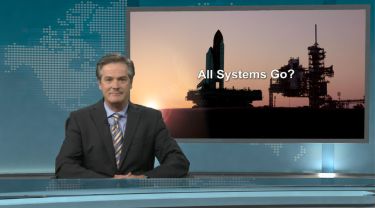Launch day is pivotal for space programs. It has been years in the making. The science took decades to perfect. It depends on the entire history of several scientific disciplines. And it takes an army of specialists to ensure that launch day arrives, and that it succeeds. These all must be working in concert, understanding the importance of each detailed and highly complex task, executing flawlessly. One slight hitch, another costly delay. One tiny flaw, potential catastrophe. The parallels with the global economy are not exact, but they’re close.
A rocket poised for launch is one of the best examples of potential energy. Does the economy have any of that? Many believe that the fuel is spent, that the best we can do is sputter along until we run out—that we’re pretty much tapped out, and our next recession is imminent. It’s interesting that many of the same people lament the global economy’s sub-standard post-recession performance and explain it away as a new normal. Meanwhile, there are large chunks of activity that, 10 years on, have still not recovered. Business and residential investment in the United States and EU economies is like that rocket on the launch pad: there’s lots of pent-up pressure there that could vault the developed world forward for several years, pulling emerging markets along for the ride.
Why isn’t this happening? If it’s truly the case, wouldn’t consumers and businesses have done it already? Normally, yes. This time around, we were down for so long that it has been difficult to pull the switch—it’s sort of a “you first” world. We were just getting to that point in the two “engine” economies when populism and politics got in the way. Weary of waiting for successive elected leaders to get it right, large chunks of the global population have given up on post-war institutions and the few that they see as benefitting from them. They are electing leaders that at least in word are willing to challenge the accepted norms and propose new and radical policies for the future.
The tangible moves are obvious: tearing up the Trans-Pacific Partnership (TPP); challenging the Canada-United States-Mexico Agreement (CUSMA); voting for Brexit; the U.S.-China tariff war; and less overt actions that take advantage of the melee. Mission Control is in disarray and investors are pulling back. That’s right: at the very moment business investment is poised to take the baton, there’s so much chaos among the engineers that those with the money are sitting on the sidelines. If business investment was hesitating before, it’s doing it now in spades.
We believe that there will be resolution on all major counts, and that this year will be a pivot-point in the global trade space. Why so upbeat? Precisely because the costs of impasse or escalation are simply too great, for all parties involved. There’s simply too much political motivation to get the program back on track and restart the countdown clock.
As such, EDC’s Spring 2019 Global Economic Outlook forecasts that after a temporary moderation in growth, the global economy will accelerate from 3.4% this year to 4% in 2020. This presumes the resolution of trade friction and the subsequent unleashing of business investment, which spurs job creation and a rebooting of residential investment. Developed markets will ramp up from 1.9% growth in 2019 to 2.2% next year, with the U.S. economy taking the lead. Emerging markets will follow on with 4.2% growth this year, which increases to 5.4% in 2020.
Despite this ramp-up, commodity prices are generally expected to see only modest growth. The temporary softening of growth this year has slowed the pace of interest rate hikes, which together with the commodity price outlook will ensure that the Canadian dollar stays below the US80-cent threshold. As such, Canada’s exports are forecast to post back-to-back growth in spite of the challenges posed by specific trade-inhibiting policy actions. Demand conditions across the globe paint a positive near-term picture for exporters.

















